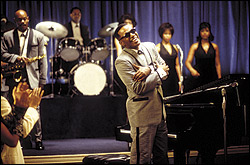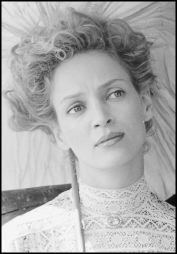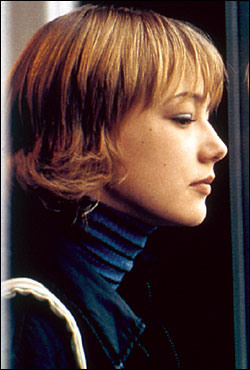Ray Charles’ life had enough stuff in it for three movies, and there are moments near the end of this two-and-one-half-hour biopic when it feels as though director Taylor Hackford is going for every last minute of it in Ray (which opens Friday, Oct. 29, at the Guild 45th and other theaters). Charles, who died last June at 73, led a sprawling, messy, sometimes hurtful life, with music—his music, his way—as its driving force. Wives, lovers, children, business associates, and old friends found themselves held close for a while, then jettisoned. But always, there was (almost) enough charm to paper over the pain in his wake; and, in any case, it never touched the hurt he lived with every day.
Ray is an honorable running overview of the events of his life, long on soul, short on heart. It goes right up to the source of his greatest guilt and shame (an event when he was 5), then fails to connect us to the boy who felt it—or to the vulnerable adolescent orphan who must have struggled with it. The film is most potent in his early years on the road during the ’50s, when fellow band members, to a man, use his blindness to abandon him. That isolation we feel. To those who’ve only known Charles for his dazzling smile and sunglasses, these realities of his blindness, and those who took advantage of it, are sobering.
Crucially, Ray has Jamie Foxx, and the electricity that comes from watching a good actor shake off the husks of every ignoble, unworthy, dues-paying role and step easily into greatness. Back-to-back with his polar opposite character in Collateral, it pretty well makes 2005 Foxx’s year at the Academy Awards. (Regrets, again, to Jeff Bridges and his turn in The Door in the Floor.)
Leaving behind the tics of impersonation, Foxx goes straight for essence. This isn’t a halfway-decent connect-the-dots, it’s a great, distilled, layered portrait—with songs, fortunately, in Charles’ own voice. (Pianist Foxx plays in the close shots.) Beyond the singer’s great body language— hugging himself for joy, playfully slipping his hand along a pretty girl’s wrist—Foxx fleshes out his moods: joyous, driven, suspicious, prideful, lusty, and deeply solitary. For the most part, newcomer James L. White’s script and Hackford’s direction charts a straight road through the decades, coming to a close at 1966.
However, because it is Hackford (The Idolmaker, White Nights, An Officer and a Gentleman), there’s no flinching in the face of melodrama or cringe-inducing sentimentality. Well, hell, even with Charles himself behind him, it took Hackford 15 years to get this picture made. And considering what we’re looking at right now in the “real” world of politics, what’s a little uplifting melodrama on a movie screen?
Besides, there’s something for everyone musically: the big concerts of the ’50s and ’60s, the Raelettes, Charles’ early sound (very Nat King Cole), and his breakthrough to rhythm and blues. And, weaving through it all, legions of women, basking in his undisguised appreciation. Every one of the film’s actresses is a barn burner: his unwavering mother (newcomer Sharon Warren); his more-than-saintly wife (Kerry Washington); and more than one wife-on-the road (including Regina King and Aunjanue Ellis).
The far-from-linear story is most fascinating as we collect the early bits of the Charles story, which picks him up at 18 in 1948. In north Florida, he’s desperate to get to Seattle’s music scene via a Greyhound bus. About to be roughed up by a state trooper for his temerity, Charles (who knows a military man when he hears one) explains that he lost his sight in Korea, and is ushered on board like a hero. As he sits there, we move to rural Georgia when he was 5 and witness the real story of his blindness.
It’s a canny segue. We’ve had a taste of Charles’ ingenuity, now for reality. The mystery is why Hackford uses garish, supersaturated color for the many flashbacks to this boyhood. If it’s to suggest that, to the child, his briefly sighted world had extra vividness and aura, then why continue the technique after he’s 7 and his sight completely fades?
The events behind his blindness are bizarre enough; it came on shortly after a traumatic accident in which his younger brother drowned while Charles was looking after him. What doctoring there was for sharecropper families at the time could never explain his eventual loss of sight, and while the film doesn’t actually suggest a mind-body connection, a psychiatrist decades later certainly seems to.
Charles’ lifelong independence is drilled into him by his mother, Aretha, who’s feverish in her determination that he will never have to rely on others. Having taught him as best she can, she sends him away at 7 to a school for the blind. Dying while he’s still in school, she leaves him orphaned and alone in the segregated South of the 1940s, but with her willpower imprinted on his very DNA.
Watching the facets of his personality coalesce around this strength is probably the richest part of Ray; after a certain point, even this great swath of music becomes an unvarying parade of greats. Some of the details are telling: His way around being shortchanged as a young musician was to demand to be paid entirely in singles; his way as a recording giant was to drop one loyal company (Atlantic) for another (ABC Paramount) so that he could own his masters. He’s told, “Even Sinatra doesn’t have that.” Charles gets it. And it was certainly Sinatra who called him “the only genius in the business.” The movie may lack genius, but it’s as close as we’ll come to Charles’ own.








